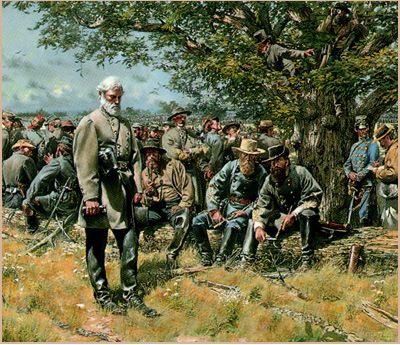 Did Lee Doom Himself At Gettysburg?, Military History Quarterly Online, August 7, 2009.
Did Lee Doom Himself At Gettysburg?, Military History Quarterly Online, August 7, 2009.By blindly relying on meager intelligence and by being unspecific with his commanders, did Lee place himself in the hands of God at Gettysburg? Lee wrote three different reports explaining decisions he made during the 1863 Pennsylvania Campaign. He implied that his corps and division commanders had failed to move in coordination with each other and he speculated that he had asked to much of the men in the ranks. What is not in his report is an awareness that he believed intelligence that he may have realized, even during the campaign, was wrong and should have treated with caution.
Could Lee have done more to ensure that his commanders understood his intentions? With a thoroughly reorganized army after the battles at Chancellorsville and 2nd Fredericksburg, should Lee have done more to communicate with leaders working in new positions. Did misapprehension and miscommunication flourish in Lee's hands-off management style?
On July 2 though in physical proximity to Hill's headquarters, it appears that Lee did not facilitate Hill's communication with either Longstreet or Ewell. With both Ewell and Longstreet, Lee had one meeting before noon on July 2 with each. A foreign observer at Lee's headquarters reported that only one was sent and one report received at the headquarters. Lee did not have a meeting of all three corps commanders together at any time on July 1, 2, or 3.
"The result of this day's (July 20 operations induced the belief that with proper concert of action and the increased support that the positions gained on the right would enable the artillery to render the assaulting columns, we should ultimately succeed," Lee reported later. He was determined to continue the July 2 assault on July 3; the objective remained unchanged from July 2 through July 3.
In his second official report Lee admitted that he might have asked more of this men that they were able to perform. To his wife Mary, Lee wrote that his men ought not to have been expected to have performed impossibilities. Lee does not leave a statement that explains how he mispreceived impossibilities as possibilities. Lee does not blame his chief of artillery, Pendleton though later Porter Alexander, Second Corps artillery commander does. A decade later at Washington College Lee spoke to William Allen of Stuart's disappointing effort during the Pennsylvania Campaign. Stuart, Lee lamented had failed to give him information and this lack of information deceived him into pursuing a battle the first week in July 1863. Lee further stated that his plan would have routed the Federal army if all elements of the Army of Northern Virginia had moved simultaneously on July 2. At most it was a 'combination of circumstances' that brought about the defeat in Pennsylvania.
It is often noted that Lee explained his generalship as making and communicating plans then allowing his commanders find ways to implement them. How the commanders did that and how the Federals resisted those actions was in God's hands. At Gettysburg his commanders and their troops (in Longstreet's words) never fought harder than on the afternoon and evening of July 2. Was Lee a fatalist like Lincoln?
The article is found at Military History Quarterly


No comments:
Post a Comment